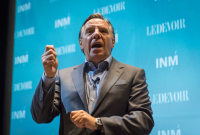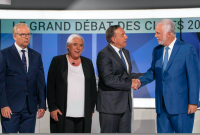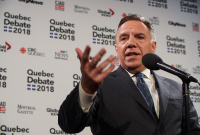Thank you for helping us meet our fundraising goal!
When the Quebec election was called Aug. 23, Coalition Avenir Quebec Leader Francois Legault sat atop the polls and the race was his to lose.
As the 39-day campaign dragged on, Legault saw his lead evaporate to the point where polls showed the Coalition tied with Philippe Couillard's incumbent Liberals a week out from Monday's election.
Then something changed.
Instead of heading to Trois-Rivieres and Quebec City as planned last Monday, he swung well north, shaking hands with supporters in Amos one day and donning safety gear at a construction site in Chibougamau the next.
Legault senses his path to a majority is through dairy-farm and aluminum-smelter country, and this final push to remote ridings reflected a confidence not seen since the early days of the campaign.
"I think the majority will come from the regions," he told reporters earlier in the week. "And I think the regions, when you look at the results, they didn't have good results from the Liberal government.
"When Mr. Couillard is saying he created 200,000 jobs in the last four years, he forgot to say that if you exclude Montreal and Quebec City, it's only 15,000."
Couillard accused Legault of leaving urban centres to get "far, far away" from the spotlight, implying the Coalition leader wanted to deflect attention from his more controversial positions.
Legault shot back, saying Quebec's regions "deserve attention and to see their candidates in person, too."
The multimillionaire co-founder of Air Transat, Legault has positioned the Coalition as the safe middle ground between the Liberals and his former political party, the pro-independence Parti Quebecois.
He is offering Quebec federalists an alternative to the Liberals, while seducing nationalist PQ supporters who see no immediate prospect of independence.
The party's power base is in Quebec City, and it is popular in the outer suburbs around Montreal and in the regions — smaller population centres with little immigration that are feeling the brunt of a declining birthrate, aging population and labour shortages.
These are the places where Legault's immigration proposals — controversial in Montreal — have gained traction. And Legault knows he could win a majority of seats without winning a single riding on the island of Montreal, the multicultural and economic centre of the province.
In the face of tough questioning on his plan to reduce immigration by 20 per cent a year and force newcomers to leave if they fail a French-language test, Legault has remained firm.
Other controversial proposals include legislation prohibiting state employees "in positions of authority," such as judges, police officers, prison guards and teachers, from wearing religious symbols on the job. He said he would invoke Sec. 33 of the federal Charter of Rights and Freedoms, the notwithstanding clause, to keep the law in force.
"We have the right to protect our culture and values," Legault told Couillard during the final leaders' debate, in one of the most testy exchanges of the evening. He acknowledged no Quebec police officers wear a hijab but added, "A premier needs to foresee things. It's going to happen."
Legault, 61, created the Coalition party in 2011, after quitting the PQ two years earlier.
He was a staunch sovereigntist as a cabinet minister in the PQ governments of Lucien Bouchard and Bernard Landry but now says he has no time for debates on separation.
"Never, ever, will a Coalition government hold a referendum on independence," he says.
But Canadians looking for a Couillard-type federalist who sings the praises of Canada will be disappointed.
Legault promises to "put Quebec first" and begin negotiations with Ottawa that would give Quebec more powers, particularly regarding immigration.
In a break from conventional political discourse, Legault is not afraid to point out Quebec's failings.
He considers it a black mark that Quebec receives equalization payments from other provinces and speaks often of making Quebec "richer."
In his closing statements during one of the leaders' debates, Legault made a simple pitch to Quebecers.
"We are offering you an economic government at the service of families," he said. "We want to build a Quebec is that is more wealthy, where we pay reasonable tax rates, and where more people graduate from school."
He urged people to vote for "the party that has its heart in the right place, and its two feet firmly on the ground."






Comments